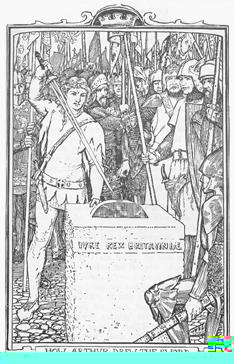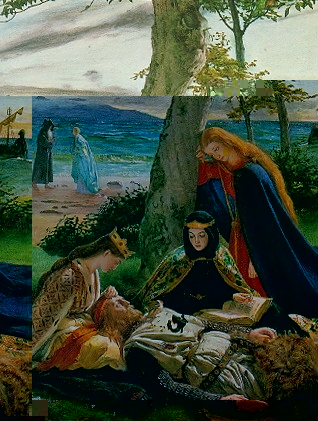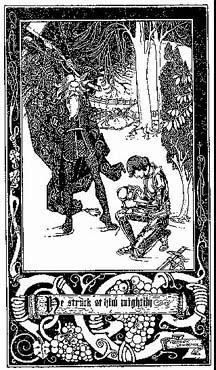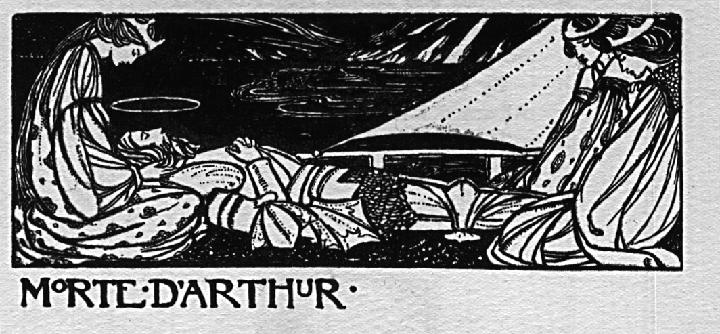ENGL 459-02: Modern Arthurian Literature
Fall 2024
 Class
meetings: TR 2-4, 26-123 Class
meetings: TR 2-4, 26-123
Office:
47-35G
Office
Hours: T 12-2, Th 4-5, and by appt.
MyCalpoly Portal
|
 Dr. Debora B. Schwartz Dr. Debora B. Schwartz
Main
English Office: 756-2597
e-mail: dschwart@calpoly.edu |

 Calendar
of Assignments Calendar
of Assignments
PLEASE NOTE that the on-line course calendar (not
any print-out you may make) is authoritative.
Assignments may be modified in the course of the
quarter. Check the on-line course calendar regularly
(before each class) to ensure that you are completing the
correct assignment.


 Course Description and
Objectives: Course Description and
Objectives:
 This
READING-INTENSIVE seminar explores how writers and
artists in other media have used Arthurian legend to
convey different messages and meanings. We will
examine 19th- and 20th-century literary works,
paintings and illustrations, films, an opera, and two
Broadway musicals as products of
their specific historical and cultural contexts and
consider how they shed light on the values and
goals of the artists which produced them and the
audiences which enjoyed them. This
READING-INTENSIVE seminar explores how writers and
artists in other media have used Arthurian legend to
convey different messages and meanings. We will
examine 19th- and 20th-century literary works,
paintings and illustrations, films, an opera, and two
Broadway musicals as products of
their specific historical and cultural contexts and
consider how they shed light on the values and
goals of the artists which produced them and the
audiences which enjoyed them.
Additionally, you will hone the
skills necessary to identify, access, and
correctly document secondary resources for a literary
research project found both at the Kennedy Library and in
the collections of other research libraries.
Finally, I hope that your study
of modern Arthuriana will pique your interest in the
medieval sources that inspired them -- and that some
of you will choose to read more medieval literature,
whether on your own or with me in another class!

  Required Textbooks: Required Textbooks:
- T. H. White, The Once and
Future King (Berkley Books
or U of Texas P; ISBN 9780441627400)
- T. H. White, The Book
of Merlyn (U of Texas P; ISBN
9780292707696)
- Alfred, Lord Tennyson, The Idylls of the
King (Penguin Classics;
ISBN 9780140422535)
- John Steinbeck, The Acts of King
Arthur and His Noble Knights (ISBN
9780374523787)
- Marion Zimmer Bradley, The Mists of Avalon
(Random House; ISBN 9780345350497)
-
ENGL 459 Homepage: Love and Death: The Tristan
Tradition
Other required
readings will be accessed electronically. "Online readings"
are .HTML files accessible through links on this
website. "E-reserves"
are .PDF files accessible through Canvas. Please be
sure to bring hard copy of required readings with
you to class.
- To access Canvas,
log in at MyCalpoly,
go to "My Courses" and select ENGL 459-02 from the
classes you are taking. Click on the Canvas link to
download, read and/or print the .PDF files using
Acrobat Reader. To access online readings in
.html files, click on the link on the Calendar of Assignments.
 Also Recommended: Also Recommended:
- Lacy, Ashe and Mancoff, eds.,
The Arthurian
Handbook, 2nd. ed.
(Taylor/Garland, 1997; ISBN 9780815320814)
- The New Arthurian
Encyclopedia, ed. Norris J. Lacy, et
al.
(Copies of these texts are on reserve for ENGL 459
in the Kennedy Library)
 Films:
All students are required to screen five Arthurian films
and to read assigned critical assessments of these films: Films:
All students are required to screen five Arthurian films
and to read assigned critical assessments of these films:
Please note that only clips from the films will be
screened in class; you will need to see them on your own
prior to the class meeting at which they will be discussed
(as assigned on the course calendar).
Copies of all five films are on reserve for ENGL 459 in
the Kennedy Library. See them on your own or by
attending a group screening in the Library (details TBA).
We will also discuss 1-2 works: Wagner's Parsifal
opera (possibly) and (definitely) the Broadway musical
Spamalot, adapted from Monty
Python's Holy Grail.
The required films are the equivalent of
readings and must be viewed prior to the class
meeting at which they will be discussed.
NOTE 1: Videos and DVDs on reserve do not
circulate outside the library; they must be screened in
the library during normal library hours.
Group screenings will be scheduled in Kennedy Library
and/or at Dr. Schwartz's house (dates and times will be
posted on the course calendar), or you may see them on
your own time.
NOTE 2: You are free to access the films
online (e.g. on Hulu or for a fee from Amazon.com), to
rent them from Netflix, or to borrow a copy from a
library.
NOTE 3: Only selected scenes from the films
will be screened in class; you must arrange to see the full
film prior to the class meeting at which it will be
discussed.
  Field
Trip: The final unit of the class
covers the wonderful film Monty Python's Holy Grail
and its Broadway musical adapation, Monty
Python's Spamalot! In the past we have
used YouTube excerpts for our discussion of MP's
Spamalot!, but this quarter, the touring
production of Monty Python's Spamalot
will be at the Performing Arts Center on campus,
courtesy of Cal
Poly Arts, on Thursday, March 14, the date of our
last class meeting! Thanks to the generosity of
Steve Lerian, Director of Cal Poly Arts. and an equally
generous subsidy from the English Department
Discretionary Fund, our final class activity this
quarter will be an on-campus "field trip" to see the
musical Monty Python's Spamalot performed live
on stage at our very own Performing Arts Center!!
Prior to the 7:30 PM performance, attend an
optional (and free) pre-show lecture at 6:30 PM
in the Pavilion Field
Trip: The final unit of the class
covers the wonderful film Monty Python's Holy Grail
and its Broadway musical adapation, Monty
Python's Spamalot! In the past we have
used YouTube excerpts for our discussion of MP's
Spamalot!, but this quarter, the touring
production of Monty Python's Spamalot
will be at the Performing Arts Center on campus,
courtesy of Cal
Poly Arts, on Thursday, March 14, the date of our
last class meeting! Thanks to the generosity of
Steve Lerian, Director of Cal Poly Arts. and an equally
generous subsidy from the English Department
Discretionary Fund, our final class activity this
quarter will be an on-campus "field trip" to see the
musical Monty Python's Spamalot performed live
on stage at our very own Performing Arts Center!!
Prior to the 7:30 PM performance, attend an
optional (and free) pre-show lecture at 6:30 PM
in the Pavilion
Tickets for Monty Python's Spamalot will cost
each student $22.50. Please consider the ticket price to
be part of your courseware budget for the quarter. This
is a bargain! Full-price tickets are $89 each; Cal Poly
Arts is giving us a 50% discount, and the English
department is kicking in the rest. I will need to
collect funds from you no later than day 1 of week 2
(Tuesday 1/15). I will be putting our
portion of the ticket cost on my credit card, so please
remember to bring me a check for your ticket at one of
our class meetings this week if possible (that's what
the CLA Dean's Office suggested), or by Tuesday 1/15 at
the latest.
Communicating:
You are expected to have an email account and
to check it regularly. Important announcements
will be posted in Canvas and/or sent over the class email alias.
The class email alias is automatically generated using
the email address of each enrolled student found in the
Cal Poly Directory server. If your Cal Poly email
account is NOT your preferred email address, you must
- Log into http://my.calpoly.edu/
and click on "Grades and Personal Information" (the
"Personal Information Channel") to change your
Email Delivery Address. Once you have done so,
any email sent to your <username@calpoly.edu>
, including all postings to the class alias, will be
forwarded to the address you have designated.
Remember: you are responsible for any information sent
over the class email alias (e.g. changes in
assignments; other class-related announcements), so be
sure to check your email regularly. You may also use
the alias to send a query or comment to the whole class
(including your instructor). Please do not use the
alias for matters unrelated to class.

  Attendance Policy: Due
to the twice-weekly seminar format, any absence causes
you to miss a substantial chunk of material. Regular
and punctual attendance is required.
Please note that EVERY absence will affect the 20% Intellectual Engagement,
Participation and Collaboration component of your
final course grade. Attendance Policy: Due
to the twice-weekly seminar format, any absence causes
you to miss a substantial chunk of material. Regular
and punctual attendance is required.
Please note that EVERY absence will affect the 20% Intellectual Engagement,
Participation and Collaboration component of your
final course grade.
Each student starts out with a 4.0 for
attendance. This component of your final grade
drops by .1 for the first EXCUSED absence (4.0
to 3.9) and .2 for the second excused absence
(3.9 to 3.7). Additionally, it drops .3
for the first UNEXCUSED absence; the penalty increases
by .1 for each subsequent unexcused absence (from A
[4.0] to A- [3.7] to B+ [3.3], to B- [2.8], etc.). Excused
absences in excess of two (a full
week, 10% of the class) count the same as
unexcused absences.
Please note that only absences resulting from illness,
a family emergency, or circumstances truly
beyond your control count as excused.
Absences taken for personal convenience are a matter of
choice rather than necessity; they will be recorded as unexcused.
Please note that deadlines for other courses, work
conflicts and job interviews are NOT valid reasons for
missing class. Exception: a graduating
senior will be granted ONE excused absence for an
out-of-town job interview.
FOR AN ABSENCE TO BE EXCUSED, please email me, putting
"ENGL 459 absence" and the date missed on
the subject line; in the body of your email,
please repeat course number and date missed and provide
an explanation of the circumstances leading to your
absence.

Participation, Intellectual
Engagement, and Collaboration: in
addition to attendance, this component of the class
grade will reflect two sorts of online
participation.
- You will be assigned
to a Canvas discussion group of 6-8 students
to which you will post short reactions to /
reflections on the assigned readings and films.
Each week, you will be expected to post a response of
at least one paragraph to at least one assigned
reading or film, and to post a thoughtful response of
at least one paragraph to at least two of your
classmates. These postings will be graded
pass/fail only and will be factored into the
participation portion of your final course grade.
- You are also also expected
to collaborate with your classmates by
submitting research
progress reports and records of works ordered
via LINK+
or ILL
to the class research archive, located in a
Canvas "Discussion Board." There will be
separate forums for each author/text. Additionally,
there will be an ILL Repository to which you
will upload Interlibrary Loan articles you
have received electronically, and a central Other
OneSearch Library Orders Forum where you should
promptly post a list of books ordered from other
OneSearch libraries to avoid classmates placing
duplicate orders. Your complete set of Research Progress Reports
and your posts to the Other OneSearch Library
Orders forum and upload(s) to the ILL
Repository will factor into the 20% of your final course grade
that is based on Intellectual Engagement,
Participation and Collaboration; each missing
post is counted as an Unexcused Absence.

 Preparation: Preparation:
 Readings listed on the Calendar of
Assignments are to be completed BEFORE coming to class
on the date for which they are assigned. Readings
are found in the required textbooks, as .PDF files on
e-reserve in Canvas, or as .HTML files accessible
through a weblink on the calendar of assignments.
Short background assignments should normally be read
first, since they provide a context within which the
primary readings will be more meaningful. But when time
is short, concentrate on getting through the primary
readings which will be the focus of class discussion;
you can always make up the background readings later. Readings listed on the Calendar of
Assignments are to be completed BEFORE coming to class
on the date for which they are assigned. Readings
are found in the required textbooks, as .PDF files on
e-reserve in Canvas, or as .HTML files accessible
through a weblink on the calendar of assignments.
Short background assignments should normally be read
first, since they provide a context within which the
primary readings will be more meaningful. But when time
is short, concentrate on getting through the primary
readings which will be the focus of class discussion;
you can always make up the background readings later.
Be prepared to discuss readings in class. Note that the
length and difficulty of assignments vary, so look ahead
in the reading list when you are planning your time. You
will be responsible for ALL the assigned readings,
whether fully discussed in class or not, as well as for
the additional background material presented in
lectures, online readings,
or in student presentations and in class discussion.
Finally, get started on your
research early, even if your presentation date falls
towards the end of the quarter. To get started,
come to an Office Hour (or
make an appointment to see me) by the end of week
3 at the latest. Failure to do so will
result in an "F" being
averaged into the Research Report component of your
final course grade. We will use this
initial meeting to brainstorm, to discuss possible
topics and approaches, to help you get the hang of some
of the library research
tools, and/or simply to get acquainted.
After this initial meeting, feel free to come
back! This means: if you feel confused about a
research assignment, let me help you troubleshoot!

 Graded Work: Graded Work:
 Four guided research
exercises will help you begin your research for
your oral
presentation and your final
paper. Research progress reports are posted
to a class Research Archive on
each author or film to serve as a "roadmap" for anyone
who wishes to incorporate the text or film you have
researched into their final projects. Because your
RESEARCH PROGRESS REPORTS will be an important
resource for your classmates, they factor into your participation grade. Four guided research
exercises will help you begin your research for
your oral
presentation and your final
paper. Research progress reports are posted
to a class Research Archive on
each author or film to serve as a "roadmap" for anyone
who wishes to incorporate the text or film you have
researched into their final projects. Because your
RESEARCH PROGRESS REPORTS will be an important
resource for your classmates, they factor into your participation grade.
There will also be two
collaborative forums: one where you should post a list
of items you have ordered through Link+, and an
ILL Repository where you will upload Interlibrary
Loan articles you have received electronically.
The ILL Repository and the LINK+ Orders forums
allow seminar participants to pool their resources and
"share the wealth" without recalling each other's books
or wasting the library's limited financial resources by
placing multiple Interlibrary
Loan and Link+
requests for the same items. Because they are an
important resource for your classmates, they factor into
your participation grade.
 Starting in
week two or three, each reading or film will be
presented by one or more students (sign-ups the first
week of class). This ORAL PRESENTATION
(no more than 20 min. per student!) will be the
starting point for class discussion, led jointly by
presenter(s) and professor. The Oral Presentation should
discuss specific textual passages (or scenes in a film)
that you find interesting or illuminating. You may
analyze a particular episode, character, theme or motif;
discuss the use of imagery, stylistic choices, or
structural aspects of the text; or compare one of more
of these elements with previous readings. In all
cases, the presentation should be anchored by CLOSE
READING of passages from the text. If you choose, you
may refer in passing to a secondary
source which you have found particularly interesting or
useful, but you should NOT do a "book report" on the
critics you have found in your research; keep the focus
on the primary work (literary text,
artwork or film). Starting in
week two or three, each reading or film will be
presented by one or more students (sign-ups the first
week of class). This ORAL PRESENTATION
(no more than 20 min. per student!) will be the
starting point for class discussion, led jointly by
presenter(s) and professor. The Oral Presentation should
discuss specific textual passages (or scenes in a film)
that you find interesting or illuminating. You may
analyze a particular episode, character, theme or motif;
discuss the use of imagery, stylistic choices, or
structural aspects of the text; or compare one of more
of these elements with previous readings. In all
cases, the presentation should be anchored by CLOSE
READING of passages from the text. If you choose, you
may refer in passing to a secondary
source which you have found particularly interesting or
useful, but you should NOT do a "book report" on the
critics you have found in your research; keep the focus
on the primary work (literary text,
artwork or film).
Students are encouraged (but not required) to develop
the presentation topic more fully in the final research paper. Please
note: you are NOT expected to become a world expert on
your assigned topic; you are merely responsible for
helping to introduce it to your classmates!
Click on link for ORAL PRESENTATION
SCHEDULE.
On the day of the oral
presentation, Presenters will prepare and distribute an
ANNOTATED
BIBLIOGRAPHY of at least five secondary
sources dealing with the primary reading/film and/or
(for modern works) one or more of its medieval sources.
The Annotated Bibliography will be
graded for complete and correct bibliographic
citations; for the distribution of items over
the required types
of sources and modes
of access; and for the expression and quality of
the summary. Your Oral Presentation
and Annotated
Bibliography count toward your in-class
work grade.
Please note: you will need
to start researching your topic well in advance of
your presentation date in order to obtain
materials through LINK+
and Interlibrary
Loan. You should meet with Prof.
Schwartz (and other presenters on same day, if
applicable) no later than the third week of
class for some research guidance and to
discuss the focus of your presentation (possible
topics, approaches, etc.).
MIDTERM EXAM: a
closed book, two-hour exam in class on day 1 of week 8
(T ). The exam will consist of some combination of the
following: factual questions (from lectures, assigned
introductory materials, online readings and handouts,
including film criticism); chronology of works studied;
identification of key characters, events, objects and
motifs; identification of significant and representative
passages from readings; choice of essay questions. A
Scantron may be required for portions of the objective
exam.
PAPER
PROSPECTUS: Normally
ungraded; to be turned in to me as an emailed .docx
attachment by MIDNIGHT on Sunday,
. Please save your document under the
filename:
[yourlastname]459prospectus.docx
Your Prospectus must include a working title which clearly
identifies the work(s) discussed as well as topic of your
paper; a fully articulated statement of claims (not just a
statement of general topic); a tentative outline of paper;
and a working bibliography of at least eight sources
(alphabetized and in traditional bibliographic
citation format).
NOTE: If an acceptable
Prospectus is submitted on time, it will be
used solely for feedback to help you write a stronger
final research paper. But if no prospectus is
submitted or the prospectus does not fulfill
the requirements of the assignment, it will
be graded and will count for 5%
of your final course grade. In that case ONLY, the
Research Paper component of your final grade will decrease
to 25%. (Note: failure to submit a prospectus will
result in 5% of your final course grade = F.)
 RESEARCH PAPER:
12-15 pp. long, citing at least 6
secondary sources. Final paper may be connected to
oral presentation.
Worth 30%
of final course grade (except as noted above).
Unless an extension has been arranged in advance,
Research Papers (along with the original, marked up
prospectus) are due at our final class meeting, Th
, or if an extension has been arranged in
advance, no later than midnight on Sunday
before exam week. If submitted as an emailed word
attachment, please save your document under the filename
"[yourlastname]459paperW19.docx" (or .doc). RESEARCH PAPER:
12-15 pp. long, citing at least 6
secondary sources. Final paper may be connected to
oral presentation.
Worth 30%
of final course grade (except as noted above).
Unless an extension has been arranged in advance,
Research Papers (along with the original, marked up
prospectus) are due at our final class meeting, Th
, or if an extension has been arranged in
advance, no later than midnight on Sunday
before exam week. If submitted as an emailed word
attachment, please save your document under the filename
"[yourlastname]459paperW19.docx" (or .doc).
FINAL ORAL
EXERCISE: In lieu of a traditional final
exam, there will be a required
final oral exercise: a brief presentation to
your classmates of the premise and conclusions of your
final research paper. While the presentation
will be ungraded, failure to complete the Final Oral
Exercise will result in a grade of "F" being
averaged with your Midterm
Exam
score. I hope that
this final conversation of the quarter can take place in
conjunction with a Class Lunch or Dinner at my home,
to be scheduled at a mutually convenient time no
later than Wednesday of exam week. If
we are unable to schedule a final meeting at my home,
our final conversation of the quarter will take place in
our usual classroom at the scheduled exam time:
4-7 PM on Tuesday, 3/19/19. Please note
that while it will be graded Pass/Fail, this "final
conversation" is a required component of the class.
Failure to participate in the final oral exercise will
result in an F being averaged into the 30% of the course grade that
is based on exams.
NOTE: I do not typically
include reading quizzes in my 400-level
seminars. However, should it become apparent that
students are not keeping up with assigned readings,
I reserve the right to start! Reading quizzes in my
classes typically consist of a combination of
passage IDs; factual questions (based on assigned
background readings, as well as character or event IDs);
and content-specific questions based upon primary material
(readings, films and artwork: significant plot
developments, roles played by various characters,
etc.) There is typically an element of choice
on my quizzes, and they are typically unannounced.
In the (unlikely) event that reading quizzes prove
necessary, they will be incorporated into the in-class work component of your
final course grade.
 Grading: Grading:
| 20% |
Intellectual
Engagement, Participation and Collaboration
(including attendance,
Discussion Board postings, archived
research reports, uploads to the Class ILL
Repository, and a required posting in the Other
OneSearch Library Orders Forum); please note
that failure to meet with Dr. Schwartz concerning
your research topic by the end of week three
at the latest will result in an F being averaged into
this portion of your class grade! |

|
| 20% |
In-class
work: equal weight to Oral
Presentation and annotated
bibliography. (Should I determine
that reading quizzes are
necessary to ensure class members are keeping up
with assignments, they will be factored into
this portion of the final grade.) |
| 30% |
Miderm Exam. NOTE: Failure to
participate in the final
oral exercise will result in an F being
averaged with this grade. |
| 30% |
Research Paper. NOTE: If an acceptable
Research
Paper
Prospectus is
submitted on time, it will be considered
an ungraded exercise designed solely to provide
feedback to help you write a stronger final
paper. But if the prospectus submitted
does not fulfill the requirements of the
assignment, or if it is submitted late, it will
be graded and will count for 5% of your
final course grade. In that case, the
research paper itself will be worth only
25%. NOTE: Failure to submit a prospectus
will result in 5% of your final course grade =
F!! |

|
Research Tools:
|
Schwartz Web pages:
Online Readings:
- Tennyson,
"Sir
Launcelot and Queen Guinevere: A
Fragment"
- William
Morris, "The
Defence
of Guenevere" and "King
Arthur's Tomb"
- Tennyson,
"The
Lady
of Shalott"
- Robert Buchanan, "Merlin's
Tomb"
- Tennyson,
"Merlin
and the Gleam"
- Wildfrid Scawen Blunt, "To Nimue"
- Thomas de Beverley, "The Story of
Nimue"
- Tennyson,
"Sir
Galahad"
- James
Russell
Lowell, "The
Vision
of Sir Launfaul"
- William
Morris, "Sir
Galahad:
A Christmas Mystery" and "The
Chapel
in Lyoness"
- Eugene Field, "The
Vision
of the Grail"
- Sophie Jewett, "The
Dwarf's
Quest: A Ballad"
|
Arthurian Resources:
|


Contents of this and linked pages on this site
Copyright Debora B. Schwartz, 1996-2019
Last updated 1/7/19
|
 Class
meetings: TR 2-4, 26-123
Class
meetings: TR 2-4, 26-123
 Dr. Debora B. Schwartz
Dr. Debora B. Schwartz

 This
READING-INTENSIVE seminar explores how writers and
artists in other media have used Arthurian legend to
convey different messages and meanings. We will
examine 19th- and 20th-century literary works,
paintings and illustrations, films, an opera, and two
Broadway musicals as products of
their specific historical and cultural contexts and
consider how they shed light on the values and
goals of the artists which produced them and the
audiences which enjoyed them.
This
READING-INTENSIVE seminar explores how writers and
artists in other media have used Arthurian legend to
convey different messages and meanings. We will
examine 19th- and 20th-century literary works,
paintings and illustrations, films, an opera, and two
Broadway musicals as products of
their specific historical and cultural contexts and
consider how they shed light on the values and
goals of the artists which produced them and the
audiences which enjoyed them. 
 Attendance Policy: Due
to the twice-weekly seminar format, any absence causes
you to miss a substantial chunk of material. Regular
and punctual attendance is required.
Please note that EVERY absence will affect the 20%
Attendance Policy: Due
to the twice-weekly seminar format, any absence causes
you to miss a substantial chunk of material. Regular
and punctual attendance is required.
Please note that EVERY absence will affect the 20%  Readings listed on the Calendar of
Assignments are to be completed BEFORE coming to class
on the date for which they are assigned. Readings
are found in the required textbooks, as .PDF files on
e-reserve in Canvas, or as .HTML files accessible
through a weblink on the calendar of assignments.
Short background assignments should normally be read
first, since they provide a context within which the
primary readings will be more meaningful. But when time
is short, concentrate on getting through the primary
readings which will be the focus of class discussion;
you can always make up the background readings later.
Readings listed on the Calendar of
Assignments are to be completed BEFORE coming to class
on the date for which they are assigned. Readings
are found in the required textbooks, as .PDF files on
e-reserve in Canvas, or as .HTML files accessible
through a weblink on the calendar of assignments.
Short background assignments should normally be read
first, since they provide a context within which the
primary readings will be more meaningful. But when time
is short, concentrate on getting through the primary
readings which will be the focus of class discussion;
you can always make up the background readings later. 



